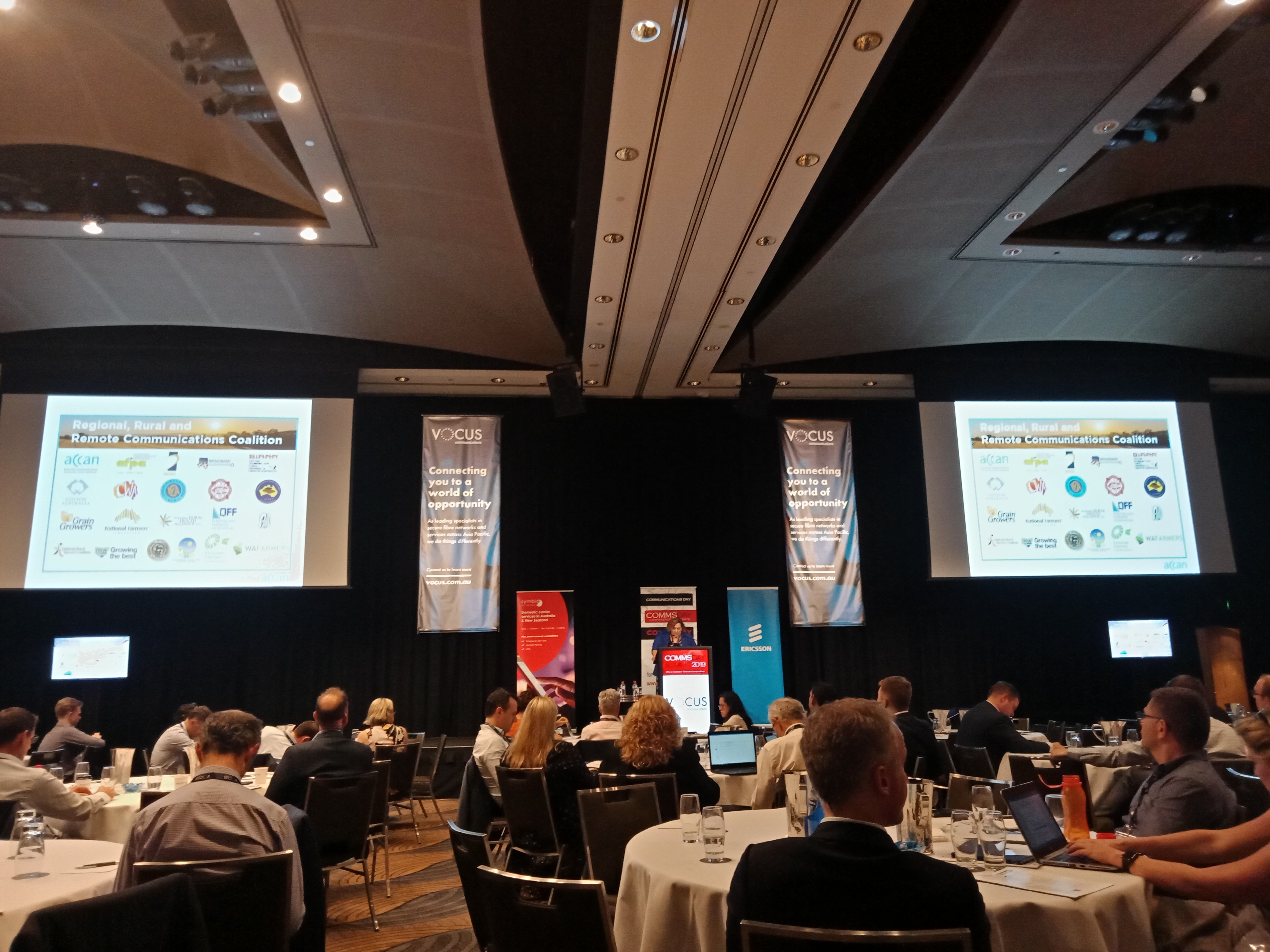Key Dates
Next Grant Round:
Applications for funding will open early 2025.
> Information about our Grants Program
Independent Grants Panel:
Results of the recent EOI will be notified Dec 2024.
> Information about our Panel
We can help: grants@accan.org.au
or phone 02 9288 4000
Subscribe to Grants Program mailings
 What is the Consumer Data Right (CDR)?
What is the Consumer Data Right (CDR)?
The CDR refers to the right of consumers to safely access certain data about themselves that is held by businesses. This data will be provided to consumers in a practical form and in a timely manner.
The CDR will also allow consumers to transfer their data to trusted third parties of their choice, and will require businesses to inform consumers about the disclosure of data to third parties.
Read more: Consumer Data Right – What Is It and What Does It Mean for Consumers?
Write comment (0 Comments)The Australian Communication Consumer Action Network (ACCAN) welcomed today’s announced measures from the ACCC to improve the affordability of entry-level nbn plan, and to ensure that consumers are better compensated for missed nbn appointments.
“The issue of affordable broadband has never been more real for the millions of Australians who have turned to online services this year for access to healthcare, education, work, and government services,” said ACCAN CEO, Teresa Corbin.
“We’re pleased that following the ACCC’s recommendation, NBN Co have agreed to reduce the price of their entry-level access bundle. However, it is disappointing that the ACCC has not recognised that 12/1 Mbps nbn plans are not an adequate entry-level option for most consumers.
Read more: ACCC’s effort to improve broadband affordability and consumer compensation commended
ACCAN recently submitted to the Senate Select Committee on Australia's Disaster Resilience (the Committee). In response to the impacts that natural disasters may have on telecommunications consumers in regional, rural, and remote areas, ACCAN believes the Committee should consider:
Read more: Select Committee on Australia's Disaster Resilience

ACCAN CEO Teresa Corbin recently spoke at the CommsDay Summit, a telecommunications industry event attended by regulators, consumer groups, telco executives and government representatives. Ms Corbin spoke about the inadequacies of the TCP Code in protecting consumers, how Australians with disability are being underserved by the telcos when it comes to their right to appropriate and independent information, and initial outcomes from ACCAN's work highlighting the need for affordable broadband across the country.
Her speech is available below.
Read more: ACCAN CEO Teresa Corbin addresses CommsDay Summit
Write comment (0 Comments)The Australian Communications Consumer Action Network (ACCAN) has welcomed NBN Co’s decision to extend its Education Assistance offer until 15 January 2021. The targeted offer from NBN Co waives the wholesale costs for many services on the 25/5 Mbps speed tier and encourages telcos to offer free or heavily discounted nbn plans to low-income households with school-aged children.
“The nbn Education Assistance offer has meant that thousands of low-income households have been able to connect to the nbn for the first time,” said ACCAN Director of Policy, Una Lawrence.
“Without the financial assistance from this offer, many struggling households couldn’t afford a fixed home broadband connection. This would leave countless children offline and unable to learn from home during the rolling shutdowns of schools across the country during the COVID-19 pandemic.”
Read more: Consumers to benefit from extension of NBN Co financial assistance packages
ACCAN recently submitted to the ACCC’s consultation on the Environmental and sustainability claims - Draft guidance for business (the Draft Guidance).
ACCAN supports:
Read more: Environmental and sustainability claims - Draft guidance for business
Have you ever gone into a telecommunications store with a plan of what you wanted, but came out with something different? Something more expensive?
ACCAN often hears stories of consumers who were sold more expensive plans or products than they had planned for and sometimes, more than they can afford. This results in difficulties keeping up with payments, and kicks off a spiral of financial problems with lasting consequences. Cases of mis-selling have been widely reported in the media recently1, and continue to occur. In February 2019, poor sales practices leading to customer debt was identified by the Telecommunications Industry Ombudsman as a systemic issue in complaints2.
Read more: Are You Being Sold? - A spotlight on telco sales commissions and targets
Write comment (0 Comments)New research from the National Youth Commission of Australia (NYC) highlights the need to urgently address internet affordability, according to the Australian Communications Consumer Action Network (ACCAN).
The NYC’s Inquiry into Youth Employment and Transitions Interim Findings Report shows that limited access to technology, insufficient digital literacy and a lack of affordable internet services are limiting opportunities for the nation’s young people.
“The National Youth Commission’s research points to case study after case study that demonstrates the real-life impacts that not being online can have,” said ACCAN CEO, Teresa Corbin.
“Without access to the internet and the digital literacy skills to navigate online, young people are simply unable to engage with government services to get the help they need.”
Ms Corbin said that the COVID-19 pandemic had shone a light on the digital divide.
Read more: Youth research highlights need to address internet affordability
ACCAN recently submitted to the Department of Infrastructure, Transport, Regional Development, Communications and the Arts (the Department) consultation on possible amendments to pit and pipe exemption criteria. ACCAN supports, in part, the proposed changes, and we further recommended that the Department:
Read more: Consultation on possible amendments to Pit and Pipe Exemption Criteria
Customer service in the telecommunications industry can be a frustrating experience for consumers who want and need to quickly and efficiently make contact with their provider.
In 2016/17 the Telecommunications Industry Ombudsman (TIO) received 158,016 complaints. 76,932 (48.7%) of these complaints related to customer service. In the first six months of 2017/18 a further 84,914 complaints were received by the TIO.
To discover the aspects of customer service most in need of improvement, ACCAN surveyed 1,347 customers of 10 telecommunications providers. The screening process for the survey found that in the last 12 months, 51% of respondents had made contact with their provider, not including routine contact to pay a bill or top up an account. This suggests over half of telecommunications consumers have had an issue or query relating to their service.
Read more: Can you hear me? Ranking the customer service of Australia’s phone and internet companies
Write comment (0 Comments)The Australian Communications Consumer Action Network (ACCAN) has welcomed action by the Australian Communications and Media Authority (ACMA) against telcos who breached consumer protection rules.
“Telstra, Optus, TPG and Dodo are four of the country’s biggest telcos; they know the rules regarding migrating to the NBN and what they need to do to keep consumers connected. It is very disappointing that they have failed their customers by leaving them without a working internet service,” said ACCAN Director of Policy, Una Lawrence.
Read more: ACCAN welcomes action by the ACMA against telcos who breached consumer protection rules
ACCAN recently submitted to a consultation on the NBN Special Access Undertaking Variation: Response to ACCC Draft Decision – Modified Pricing Options.
In our submission ACCAN expressed our qualified support for the proposed pricing framework. We noted that:
Read more: NBN SAU variation: Floor and Ceiling Modified Pricing Options
 Over the past 10 months ACCAN has been representing consumers on an industry working committee reviewing the Telecommunications Consumer Protections (TCP) Code. We have consulted broadly with our members to ensure that the consumer voice is heard and worked closely with Legal Aid NSW, the other consumer representative on the Committee. A draft of the amended Code is now out for public comment.
Over the past 10 months ACCAN has been representing consumers on an industry working committee reviewing the Telecommunications Consumer Protections (TCP) Code. We have consulted broadly with our members to ensure that the consumer voice is heard and worked closely with Legal Aid NSW, the other consumer representative on the Committee. A draft of the amended Code is now out for public comment.
The Code is important because it sets out rules for how telcos must deal with their customers. It covers sales, customer service, contracts, billing, credit and debt management, financial hardship, and transfers between providers. It is a key component of the consumer protection framework for the telecommunications industry. This is especially the case now, in light of the significant rise in complaints to the Telecommunications Industry Ombudsman (TIO), and the rollout of the National Broadband Network (NBN) that is causing significant confusion and frustration for consumers.
Read more: TCP Code Review: Consumers must come first
Write comment (1 Comment)New complaints data released today suggests that telcos need a customer service shake-up as consumers continue to deal with no or delayed action from telecommunications providers, according to the Australian Communications Consumer Action Network (ACCAN).
Nearly a third (31 per cent) of complaints escalated to the Telecommunications Industry Ombudsman (TIO) by between January and March 2020 related to issues with no or delayed action from telecommunications providers. An additional 11 per cent of complaints had a resolution agreed to by the telco and consumers, but not met.
Read more: New complaints data shows customer service issues continue for telcos
ACCAN has recently (Aug 2023), provided feedback on the Government’s Draft Communications Legislation Amendment (Combatting Misinformation and Disinformation) Bill.
The Bill provides the Australian Communications and Media Authority (ACMA) with reserve powers to ensure that digital platform services are working to protect Australians against harm from online mis and disinformation.
 NBN Co has recently announced changes to wholesale prices charged to retail service providers (RSPs) from October 2018. These changes mean consumers can expect to pay higher prices to access NBN services.
NBN Co has recently announced changes to wholesale prices charged to retail service providers (RSPs) from October 2018. These changes mean consumers can expect to pay higher prices to access NBN services.
At the same time consumers can expect to have an improved experience as congestion in the network is addressed through greater dedication of bandwidth per individual customer.
The proposed changes to wholesale pricing will likely result in significant disadvantages for consumers on low incomes. ACCAN has been advocating for more affordable broadband and would like to see low income measures to address fairer NBN pricing.
Read more: ACCAN’s Analysis of NBN Co’s recently announced Pricing Changes
Write comment (2 Comments)The Australian Communications Consumer Action Network (ACCAN) thanks the Telecommunications Industry Ombudsman (TIO) for investigating systemic issues affecting small businesses’ communications services.
“A reliable phone and internet service is fundamental for most modern small businesses,” said ACCAN CEO, Teresa Corbin.
“Unfortunately, in the past few years we’ve seen the share of TIO complaints from small businesses continually increase. The TIO’s report helps to identify some of the complex issues that small businesses face when there is a fault with their phone or internet service.”
Read more: Small businesses need telco services that are fit for purpose: ACCAN
ACCAN recently commented on the Australian Competition and Consumer Commission’s March 2024 report on data brokers issues paper. The report is the most recent investigation by the regulator as part of the Digital Platform Services Inquiry.
Read more: Digital Platform Services Inquiry – March 2024 report on data brokers issues paper
 Minister for Communications and the Arts Mitch Fifield, in response to an Australian Sign Language video question on the ABC’s Q&A program this week [at 35min 50sec], pledged that Australians who are Deaf, hearing and/or speech impaired will have the service they need when the Government implements the next National Relay Service (NRS) contract.
Minister for Communications and the Arts Mitch Fifield, in response to an Australian Sign Language video question on the ABC’s Q&A program this week [at 35min 50sec], pledged that Australians who are Deaf, hearing and/or speech impaired will have the service they need when the Government implements the next National Relay Service (NRS) contract.
The issue raised by Deaf Australia CEO Kyle Miers, is that the current cost of providing the NRS is in excess of $32 million per annum and the recently released NRS request for tender has capped the service funding at $22 million per annum for the next three year.
The question of how a 30% reduction in funding can ensure services will continue on a 24/7 basis was asked on behalf of the Coalition of NRS Users Organisations;
Read more: Support for the NRS and the Ministers pledge
Write comment (0 Comments)Passage of the Telecommunications Reform Package is a key step towards guaranteeing country communities access to reliable communications, according to the Regional, Rural and Remote Communications Coalition (RRRCC).
Due before the Senate in March, the Telecommunications Reform Package aims to provide improved access to broadband services across the country with an emphasis on regional, rural and remote areas. This would be made possible through the introduction of two separate Bills – the Telecommunications Legislation Amendment (Competition and Consumer) Bill 2019 and the Telecommunications (Regional Broadband Scheme) Charge Bill 2019.
Read more: Regional groups call for passage of Telecommunications Reform Package
The Australian Communications Consumer Action Network (ACCAN) recently commented on phase two of the Australian Bureau of Statistics (ABS) 2026 Census topic consultation. ACCAN is disappointed by the ABS’ decision not to proceed with the topic of ‘internet access and use, including digital literacy’.
ACCAN believes the collection of national data on household internet access, use and digital literacy is critical towards understanding how Australian households get and stay connected online. It is also critical for addressing barriers to digital inclusion for First Nations communities and people with disability.
 The NSW Law Reform Commission will examine laws regarding access to a deceased or incapacitated person’s social media account and other digital assets. The NSW Law Reform Commission outlines that digital assets can include images, videos, emails, online banking accounts, cryptocurrency, domain names, blogs and online gaming accounts.
The NSW Law Reform Commission will examine laws regarding access to a deceased or incapacitated person’s social media account and other digital assets. The NSW Law Reform Commission outlines that digital assets can include images, videos, emails, online banking accounts, cryptocurrency, domain names, blogs and online gaming accounts.
The move comes after concerns over what happens to digital assets after death or incapacitation in an increasingly connected world.
‘In today’s hyper-connected world, an unprecedented amount of work and socialising occurs online, yet few of us consider what happens to our digital assets once we’re gone or are no longer able to make decisions’, Attorney General, Mark Speakman, said.
Read more: Review of social media and other digital assets after death or incapacitation
Write comment (0 Comments)Australia’s consumer voice on communications issues, the Australian Communications Consumer Action Network (ACCAN), has cautioned that consumers may seek alternative home broadband solutions, like 5G, if NBN prices are not addressed.
“As home broadband alternatives like 5G become more accessible in more areas across the country, NBN Co is going to have to demonstrate to cost-conscious consumers why they should choose an NBN service over these alternatives,” said ACCAN CEO, Teresa Corbin. “This means that they’re going to have to provide more competitive wholesale prices if they want to keep customers in these areas.”
Read more: Consumers may walk away from NBN if the price isn’t right: ACCAN
ACCAN recently submitted to the Australian Communication and Media Authority’s (ACMA) consultation on the Proposed approach to expiring spectrum licenses. ACCAN’s submission supports the ACMA’s proposed 4-stage process for considering renewals of expired spectrum licenses (ESL).
Additionally, our submission supports:
